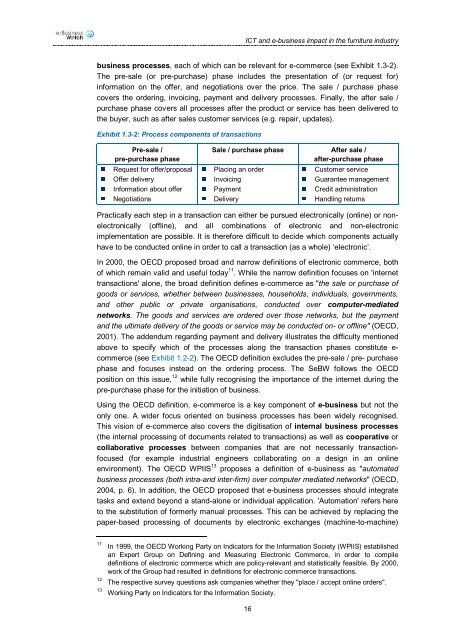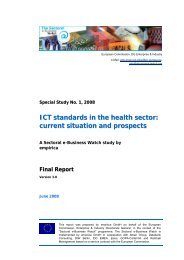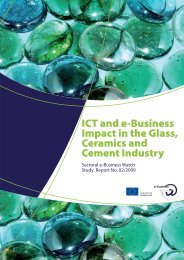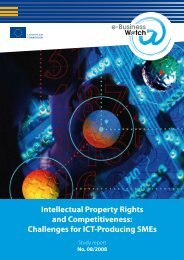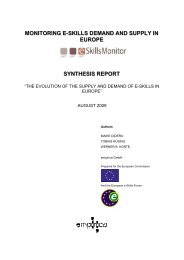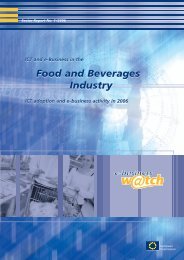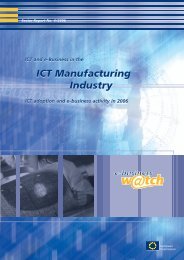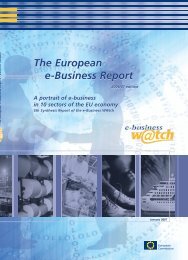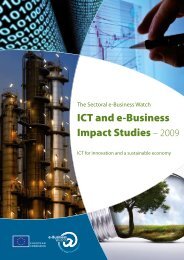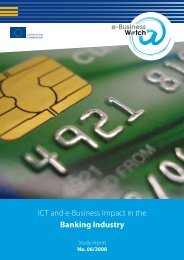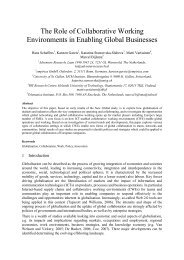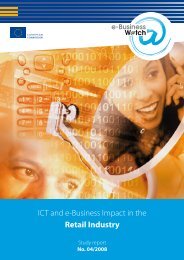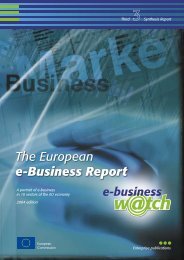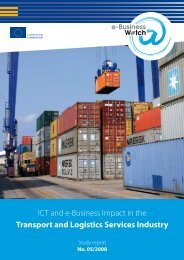ICT and e-Business Impact in the Furniture Industry - empirica
ICT and e-Business Impact in the Furniture Industry - empirica
ICT and e-Business Impact in the Furniture Industry - empirica
- No tags were found...
Create successful ePaper yourself
Turn your PDF publications into a flip-book with our unique Google optimized e-Paper software.
<strong>ICT</strong> <strong>and</strong> e-bus<strong>in</strong>ess impact <strong>in</strong> <strong>the</strong> furniture <strong>in</strong>dustrybus<strong>in</strong>ess processes, each of which can be relevant for e-commerce (see Exhibit 1.3-2).The pre-sale (or pre-purchase) phase <strong>in</strong>cludes <strong>the</strong> presentation of (or request for)<strong>in</strong>formation on <strong>the</strong> offer, <strong>and</strong> negotiations over <strong>the</strong> price. The sale / purchase phasecovers <strong>the</strong> order<strong>in</strong>g, <strong>in</strong>voic<strong>in</strong>g, payment <strong>and</strong> delivery processes. F<strong>in</strong>ally, <strong>the</strong> after sale /purchase phase covers all processes after <strong>the</strong> product or service has been delivered to<strong>the</strong> buyer, such as after sales customer services (e.g. repair, updates).Exhibit 1.3-2: Process components of transactionsPre-sale /pre-purchase phaseRequest for offer/proposalOffer deliveryInformation about offerNegotiationsSale / purchase phase After sale /after-purchase phasePlac<strong>in</strong>g an orderInvoic<strong>in</strong>gPaymentDeliveryCustomer serviceGuarantee managementCredit adm<strong>in</strong>istrationH<strong>and</strong>l<strong>in</strong>g returnsPractically each step <strong>in</strong> a transaction can ei<strong>the</strong>r be pursued electronically (onl<strong>in</strong>e) or nonelectronically(offl<strong>in</strong>e), <strong>and</strong> all comb<strong>in</strong>ations of electronic <strong>and</strong> non-electronicimplementation are possible. It is <strong>the</strong>refore difficult to decide which components actuallyhave to be conducted onl<strong>in</strong>e <strong>in</strong> order to call a transaction (as a whole) ‘electronic’.In 2000, <strong>the</strong> OECD proposed broad <strong>and</strong> narrow def<strong>in</strong>itions of electronic commerce, bothof which rema<strong>in</strong> valid <strong>and</strong> useful today 11 . While <strong>the</strong> narrow def<strong>in</strong>ition focuses on '<strong>in</strong>ternettransactions' alone, <strong>the</strong> broad def<strong>in</strong>ition def<strong>in</strong>es e-commerce as "<strong>the</strong> sale or purchase ofgoods or services, whe<strong>the</strong>r between bus<strong>in</strong>esses, households, <strong>in</strong>dividuals, governments,<strong>and</strong> o<strong>the</strong>r public or private organisations, conducted over computer-mediatednetworks. The goods <strong>and</strong> services are ordered over those networks, but <strong>the</strong> payment<strong>and</strong> <strong>the</strong> ultimate delivery of <strong>the</strong> goods or service may be conducted on- or offl<strong>in</strong>e" (OECD,2001). The addendum regard<strong>in</strong>g payment <strong>and</strong> delivery illustrates <strong>the</strong> difficulty mentionedabove to specify which of <strong>the</strong> processes along <strong>the</strong> transaction phases constitute e-commerce (see Exhibit 1.2-2). The OECD def<strong>in</strong>ition excludes <strong>the</strong> pre-sale / pre- purchasephase <strong>and</strong> focuses <strong>in</strong>stead on <strong>the</strong> order<strong>in</strong>g process. The SeBW follows <strong>the</strong> OECDposition on this issue, 12 while fully recognis<strong>in</strong>g <strong>the</strong> importance of <strong>the</strong> <strong>in</strong>ternet dur<strong>in</strong>g <strong>the</strong>pre-purchase phase for <strong>the</strong> <strong>in</strong>itiation of bus<strong>in</strong>ess.Us<strong>in</strong>g <strong>the</strong> OECD def<strong>in</strong>ition, e-commerce is a key component of e-bus<strong>in</strong>ess but not <strong>the</strong>only one. A wider focus oriented on bus<strong>in</strong>ess processes has been widely recognised.This vision of e-commerce also covers <strong>the</strong> digitisation of <strong>in</strong>ternal bus<strong>in</strong>ess processes(<strong>the</strong> <strong>in</strong>ternal process<strong>in</strong>g of documents related to transactions) as well as cooperative orcollaborative processes between companies that are not necessarily transactionfocused(for example <strong>in</strong>dustrial eng<strong>in</strong>eers collaborat<strong>in</strong>g on a design <strong>in</strong> an onl<strong>in</strong>eenvironment). The OECD WPIIS 13 proposes a def<strong>in</strong>ition of e-bus<strong>in</strong>ess as "automatedbus<strong>in</strong>ess processes (both <strong>in</strong>tra-<strong>and</strong> <strong>in</strong>ter-firm) over computer mediated networks" (OECD,2004, p. 6). In addition, <strong>the</strong> OECD proposed that e-bus<strong>in</strong>ess processes should <strong>in</strong>tegratetasks <strong>and</strong> extend beyond a st<strong>and</strong>-alone or <strong>in</strong>dividual application. 'Automation' refers hereto <strong>the</strong> substitution of formerly manual processes. This can be achieved by replac<strong>in</strong>g <strong>the</strong>paper-based process<strong>in</strong>g of documents by electronic exchanges (mach<strong>in</strong>e-to-mach<strong>in</strong>e)111213In 1999, <strong>the</strong> OECD Work<strong>in</strong>g Party on Indicators for <strong>the</strong> Information Society (WPIIS) establishedan Expert Group on Def<strong>in</strong><strong>in</strong>g <strong>and</strong> Measur<strong>in</strong>g Electronic Commerce, <strong>in</strong> order to compiledef<strong>in</strong>itions of electronic commerce which are policy-relevant <strong>and</strong> statistically feasible. By 2000,work of <strong>the</strong> Group had resulted <strong>in</strong> def<strong>in</strong>itions for electronic commerce transactions.The respective survey questions ask companies whe<strong>the</strong>r <strong>the</strong>y "place / accept onl<strong>in</strong>e orders".Work<strong>in</strong>g Party on Indicators for <strong>the</strong> Information Society.16


